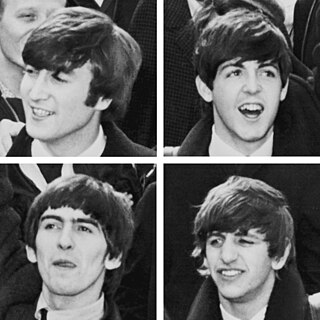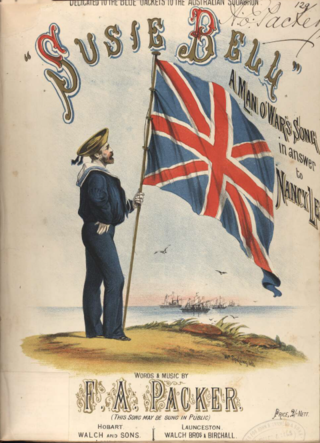
Gerry and the Pacemakers were an English beat group prominent in the 1960s Merseybeat scene. In common with the Beatles, they came from Liverpool, were managed by Brian Epstein and recorded by George Martin. Their early successes helped make popular the Merseybeat sound and launch the wider British beat boom of the mid-1960s

Bryan Waller Procter was an English poet who served as a Commissioner in Lunacy.

Renegade is the eleventh studio album by Irish rock band Thin Lizzy, released in 1981. Though not his first appearance, this was the first album in which keyboard player Darren Wharton was credited as a permanent member, becoming the fifth member of the line-up. As such, he made a contribution as a songwriter on the opening track "Angel of Death". However, even though he had officially joined the band, his picture was omitted from the album sleeve. Renegade was the second and final album to feature guitarist Snowy White. By his own admission, White was more suited to playing blues than heavy rock and he quit by mutual agreement the following year. He went on to have a hit single with "Bird of Paradise" in 1983.

"The Bonnie Blue Flag", also known as "We Are a Band of Brothers", is an 1861 marching song associated with the Confederate States of America. The words were written by the entertainer Harry McCarthy, with the melody taken from the song "The Irish Jaunting Car". The song's title refers to the unofficial first flag of the Confederacy, the Bonnie Blue Flag. The left flag on the sheet-music is the Bonnie Blue Flag.
Talking blues is a form of folk music and country music. It is characterized by rhythmic speech or near-speech where the melody is free, but the rhythm is strict.
"The Ryans and The Pittmans" is a popular Newfoundland folk song. It tells of the romantic entanglements of a sailor named Bob Pittman, and his desire to sail home to finally marry his "sweet Biddy". The song is also known as "We'll Rant and We'll Roar", after the first line of the chorus; however, this is also the name by which some foreign variants are known.
"Hard, Hard Times" is a traditional Newfoundland folk song/ballad, adapted from an earlier English song, "Rigs of the Times" by William James Emberley. The song has been sung and recorded by a number of Newfoundland musicians.
"Rolling Down to Old Maui" is a traditional sea song. It expresses the anticipation of the crew of a whaling vessel of its return to Maui after a season of whaling in the Kamchatka Sea.
"Blow the Man Down" is an English-language sea shanty, listed as 2624 in the Roud Folk Song Index.

Liverpool has a lengthy tradition of music both classical and pop. It is well known for the Beatles. Its pop and rock music scene has also been important in the development of a number of other bands and artists since the 1950s.

A Taste of Strawbs is a box-set album by Strawbs. Instead of being a "best of" album, the compilers have attempted to present alternative versions of some well-known songs plus some previously unreleased material. Included are some very old songs by The Strawberry Hill Boys, with Dave Cousins, Tony Hooper and Ron Chesterman, also are some very interesting songs by Sandy Denny and The Strawbs, and outtakes from different periods of the band's career.

To Hrono Stamatao is the tenth studio album by Greek pop-rock singer-songwriter Sakis Rouvas, released in December 2003 by Minos EMI in Greece and Cyprus. The album was re-released in May 2004 to contain Rouvas' hit "Shake It" along with a remix, which was Greece's entrant in the Eurovision Song Contest 2004 that won third place. Some of the songs from the album can also be found on the 2004 edition European release of the album Ola Kala which was used to further promote Rouvas' already stable international career after the Eurovision. The album was also released in other parts of the world such as Turkey and Russia.

"The Bold Canadian" was a patriotic song for Canadians that originated during the War of 1812. It celebrated the conquering of Detroit in Michigan Territory.
Brit Awards 2000 was the 20th edition of the Brit Awards, an annual pop music awards ceremony in the United Kingdom. They are run by the British Phonographic Industry and took place on 3 March 2000 at Earls Court in London.
The following is a discography of Richard X, a British pop music producer. It includes his releases, productions, and remixes.

"Tell that to the Marines" is a 1918 song, written during World War I. Jean Schwartz and Al Jolson composed the music; Harold Atteridge wrote the lyrics. Al Jolson performed an early version of the song. Based on sales estimates, it reached number two on the Top 100 US songs of its time.
Elton John: The Classic Years is a series of remasters of English musician Elton John's albums, covering most of his studio and live albums originally released between 1969 and 1992. Many of the remastered studio albums include bonus tracks, some of which had been B-sides or unreleased tracks, or had previously appeared on compilations such as Rare Masters and the box set To Be Continued..., while the live album Here and There was greatly expanded from its original running time.

Susie Bell was a popular nineteenth century nautical tune collected by Frederick Augustus Packer around the port at Hobart, in Tasmania. First published in 1882 London. The song is dedicated to the blue jacket sailors of the Australian Squadron, stationed in Australia. The lyrics are a rollicking Australian response to Nancy Lee written by Stephen Adams









